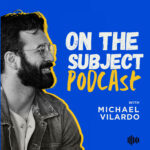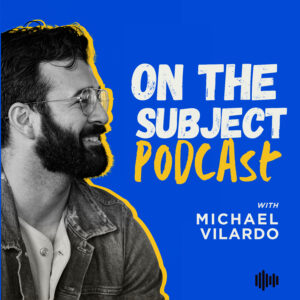#44 – Byron Union School District’s Crystal Castaneda on Transforming K–8 Learning, Empowering Teachers, and Leading the Gen Alpha Era [VIDEO]

On This Episode
Episode Transcript
Guest: Crystal Castaneda, Superintendent, Byron Union School District
Host: Michael Vilardo, Co-founder & CEO of Subject
Michael Vilardo (00:12-00:40):
Welcome back to another episode of On the Subject. I’m your host. Michael Vilardo, co -founder and CEO of Subject, Subject.com. You know where to find us? We have an incredibly special guest. Today. We’ve been all about highlighting the most innovative educators around the United States.
Over the last six months, we’ve gone to Michigan, New Mexico. Now we’re here in our home state, beautiful, sunny California, though it’s a little gray out. Today. We’re in Monterey with one of the most innovative superintendents in all of the Bay Area. Thank you so much for your time today, Crystal.
Crystal Castaneda (00:41-00:43):
Hello, thank you for having me excited to be here.
Michael Vilardo (00:43-00:45):
And let’s shout out her district, Byron.
Crystal Castaneda (00:45-00:46):
Byron Union School District.
Michael Vilardo (00:47-00:57):
Incredible district, you’re helping shape so many young minds and we appreciate how much you’ve done for students over the years. Thank you. Why do you want to do this? Why did you want to help students?
What made you love education?
Crystal Castaneda (00:58-01:29):
Well, I started in education in 1998, but I also started when I was the oldest of three kids. And I used to teach in the closet with the chalkboard, the ABCs to my sisters. So I’ve always had a passion for learning and that just built on itself as different mentors brought me into leadership roles along my career. And that led me from teaching kindergarten into becoming the principal at the site, where I was, into becoming a director of ED services and then moving into superintendency.
Michael Vilardo (01:30-01:51):
That’s amazing and I love that you’ve been able to wear every hat. Because that holistic approach, education student to teacher, to principal, director, and now superintendent, you really understand the whole gamut. Are we allowed to go here and say, Hey, what was your favorite role? Not including superintendent? So that way, we don’t put anyone on the spot.
Like, what, out of the other roles, what did you like the most, what gave you the most joy?
Crystal Castaneda (01:51-02:15):
So I will tell you, as superintendent, I’m still in the classroom a lot. Because teaching, we’re all educators, regardless of the title you have by your name, we’re educators all the way through the core. And so being able to get back into classes as much as I can, reading stories to students, being part of the work at the ground level with our staff is always my favorite.
Michael Vilardo (02:16-02:35):
I love that. And we. A common saying we always say is teachers and coaches are the heroes of society and they uplift our youth into incredible futures. And so, thank you so much for that time there. What has been the most challenging piece that you’ve been able to accomplish over the last few years? And how has your leadership been able to sear the district into such an incredible 2025 start?
Crystal Castaneda (02:37-04:33):
Great question. Challenges You’re always going to have different challenges related to the world of education because we work with such a diverse group of students and families. So they come with what they come with to us every single day. Our families are giving us their best kids. And we’re going to love them up and we’re going to teach them where they are and push them to the next level.
And so I think the challenges is just that, you know, you have so many needs within one classroom. And what are you doing to really meet? The student that’s struggling and the student that’s already learned that material and are ready for the next level? How do you build that universal design model and really support that work? This year, we instituted a multi -tiered system of supports in a grander way, we created a full master schedule at our elementary schools.
We have two elementary schools and one middle school, and with that we were able to align our times and our resource opportunities. So students with IEPs weren’t getting pulled from curricular needs that they had within the classroom. We were working on small groups for everybody in a grade level at one time, and that was a really awesome way to create the best case scenario. Of getting what you need at the time that you need it, and getting it from the experts that you need it from.
So that’s really been proving to be a very rewarding opportunity. In our data, but also in the confidence that we’re building in our students and the time that we’re using. In that space, we were able to align our end of the day to be. Students get to go home and all of our elementary teachers get to have common prep, which we know the best way to support student learning is by collaborating with the experts together and having that common prep. Time for teachers to collaborate and plan and do what they need to do at the end of every day has also been a game changer for our district.
Michael Vilardo (04:33-05:10):
That’s amazing and congrats on all the incredible cross -functional alignment you’ve been able to get through to your district. It’s really impressive. You talked about being a kindergarten teacher in 1998, you know, we’re in 2025. Now. Do a quick math as we do the podcast. So 1998 kindergarten students, probably early 90.
Birthdays 90, 91, 92.
Now we’re in 2025 K -8 district. These students, you know, you’re teaching all Gen Alpha students in some cases, what do you think the biggest difference between a gen alpha and a millennial is?
I’m a millennial, so feel free to pile on, don’t worry about it.
Crystal Castaneda (05:10-06:25):
You know, I think our biggest difference, as we’ve evolved over those generations, is the reality that technology isn’t something you do, it’s what is, it’s what you’ve always known. It’s how you think, how you thrive, how you go through life, and that change. From learning the different technology that’s come out to just getting the newest upgrades, so it’s faster for you to do whatever you need to do. That, I think, has really changed just how our brains are wired, how we’re learning, how, even the way. We want to be innovative within our classroom, on attention spans and getting kids excited about learning.
The way that classrooms have been set up for many decades is constantly evolving, and Covid put a little pin in it. With virtual reality, of the ways we teach online, and then coming back to reality after that, very different in how we engage our students. And we’re still learning the best ways to do that. But I think that they have resources that give them all the answers.
And so it’s more about critical thinking, deep thinking, innovation, big dreams and related to having the next level of leadership that they’re going to bring to the table.
Michael Vilardo (06:26-06:59):
Yeah, I couldn’t agree more with you. That’s exactly why we’re trying to focus more on video and audio submissions. Showing your ability to think creatively and put your thoughts into words, and it’s really important to be able to have that critical mind and critical thinking. And one way we always love to wrap the podcast is if you could. Think of a student or teacher that’s impacted your life and give them a shout out and thank you and pass that word forward. We always love to hear who’s impacted you.
I know it’s been thousands of people. But if a student or teacher came to mind that you wanted to give a shout out to the camera, we’d love to hear it.
Crystal Castaneda (06:59-07:06):
So my shout out would be to miss Jerry Patey, fourth grade teacher.
Michael Vilardo (07:07-07:08):
They’re going to see this.
Crystal Castaneda (07:08-08:04):
And she was definitely pivotal. I was the fourth grader that she called on, she said. Crystal, you’re a natural born teacher, I can just see it in you. You have to be a teacher.
And we had a student that came from Indonesia that did not speak any English at all, came to us fresh, without anything. And she said, I need your help. I need you to go with her in the library every day during quiet reading time, which they used to do for us for 15 20 minutes. And I need you to help her learn English, and that’s what I did.
That was in fourth grade, when we promoted from eighth grade, it was a K -8 school, that same student. I’m going to say, Katherine Hillem, because she’s also amazing, wrote me the most beautiful note about how I helped support her transition to the United States. I get teary -eyed thinking about it because it was so pivotal, but it just helped me continue my journey as an educator. Because those are the moments that are priceless, and those are the moments that matter.
And that’s why I show up for kids every day.
Michael Vilardo (08:06-08:34):
Tough to top that comment. That was unbelievable, You’re moving me right now, That was unbelievable. And this is exactly why we have this podcast.
We’re trying to highlight the most innovative approaches in education, elevate voices and really bring us back to the core, which is everything for students. That was amazing. Everyone here please like, subscribe, comment down below. We’re trying to get our YouTube and Spotify followers up. Please find us.
Another episode of On the Subject. I’m your host. Thank you so much for joining us today. It was so much fun.
Crystal Castaneda (08:34-08:35):
Thank you so much for having me, it was awesome.
Let’s talk about Subject
345 N Maple Dr. STE #130
Beverly Hills,
CA 90210, USA
Support
contact@subject.com
Academics
accreditation@subject.com
Customer Hub
Login
Support
Success Stories

